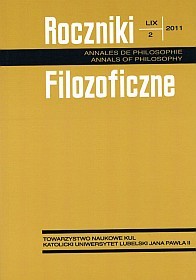Communication: Nature and Culture
Abstract
The paper concerns the inseparable, in my opinion, connection between communication and the philosophy of nature. Studies on communication, which are growing expansively, neglect, to a bigger or lesser degree, its biological dimension. Instead, they focus on the cultural, sociological, and political aspects. Furthermore, philosophers are relatively rarely concerned with communication, since they treat it, not without good reasons, as one of many cognitive processes. Problems of communication are almost entirely non-existent in the philosophy of nature, too. Admittedly, the situation is slowly changing. More and more scholars and philosophers recognizing that in the research practice the problems of philosophy and science are intertwined notice the relevance of the issues of communication and communicating. However, the research on communication is still dominated by humanists, who either neglect or completely ignore its biological component.
In the article I try to show that communication is an ideal object of common research for scientists and humanists, as well as philosophers and philosophers of nature. Communication is an ontologically complex being containing the biological and cultural component. Omitting either of these components leads to a one-sided, and thus false, view on communication.
References
Barwise J.: The Situation Logic, Center for the Study of Language and Information, Stanford University 1993.
Beniger R.: Communication – Embrace Subject, not the Field, [w:] M.R. Levy, M. Gurevitch (red.), Defining Media Studies. Reflection on the Future of the Field, New York–Oxford: Oxford University Press 1994, s. 26-33.
Biłat A., (red.): Aporie ontologii sytuacji, Lublin: Wydawnictwo UMCS 2009.
Brockman J. (red.): Nowy Renesans. Granice nauki, tł. P.J. Szwajcer i A. Eichler, Warszawa: Wydawnictwo Cis 2005.
Capra F.: Punkt zwrotny. Nauka, społeczeństwo, nowa kultura, tł. E. Woydyłło, Warszawa: Państwowy Instytut Wydawniczy 1987.
Capra F.: Tao fizyki. W poszukiwaniu podobieństw między fizyką współczesną a mistycyzmem Wschodu, tł. P. Macura, Dom Wydawniczy Rebis, Poznań 2001.
Damasio A.R.: Błąd Kartezjusza. Emocje, rozum i ludzki mózg, tł. J. Szczepański, Poznań: Dom Wydawniczy Rebis 2002.
Devlin K.: Żegnaj, Kartezjuszu. Rozstanie z logiką w poszukiwaniu nowej kosmologii umysłu, tł. B. Stanosz, Prószyński i S-ka, Warszawa 1999.
Godlewski G., Słowo – pismo – sztuka słowa. Perspektywy antropologiczne, Warszawa: Wydawnictwa Uniwersytetu Warszawskiego 2008.
Ifrah G., Historia powszechna cyfr, t. 2., tł. K. Marczewska, Warszawa: Wydawnictwo W.A.B. 2006.
„Innego końca świata nie będzie. Z Barbarą Skargą rozmawiają Katarzyna Janowska i Piotr Mucharski, Kraków: Wydawnictwo Znak 2007.
Jacob F., Gra możliwości, tł. W. Kunicki-Goldfinger, Warszawa: Państwowy Instytut Wydawniczy 1987.
Kołakowski L.: Bergson, Warszawa: Wydawnictwo Naukowe PWN 1997.
Kozera A.: Filozofia zen, Warszawa: Wydawnictwo Naukowe PWN 2004.
Levinson P.: Nowe nowe media, tł. M. Zawadzka, Kraków: Wydawnictwo WAM 2010.
Levy M.R., Gurevitch M.: Preface, [w:] M.R. Levy, M. Gurevitch (red.), Defining Media Studies. Reflection on the Future of the Field, New York–Oxford: Oxford University Press 1994, s. 7-13.
Lorenz K.: Odwrotna strona zwierciadła. Próba historii naturalnej ludzkiego poznania, tł. K. Wolicki, Warszawa: Państwowy Instytut Wydawniczy 1977.
Miller K.: Communication Theories. Perspectives, Processes and Contexts, McGraw Hill, 2002.
Monod J.: Chance and Necessity: An Essay on the Natural Philosophy of Modern Biology, New York: Alfred A. Knopf 1971.
Pelc J.: Semiotyka – nauka o poznaniu i komunikacji, [w:] E. Muszyńska (red.), Między logiką a etyką. Prace ofiarowane Profesorowi Leonowi Kojowi, Lublin: Wydawnictwo UMCS 1995, s. 285-305.
Pleszczyński J.: Dwa atomy komunikacji, [w:] G. Habrajska (red.), Rozmowy o komunikacji (40. Metodologia i praktyka komunikacji społecznej), Łask: Oficyna Wydawnicza Leksem 2010, s. 17-35.
Popper K.: Wiedza obiektywna. Ewolucyjna teoria epistemologiczna, tł. A. Chmielewski, Warszawa: Wydawnictwo Naukowe PWN 1992.
Riedl R.: Biologie der Erkenntnis. Die Stammesgeschichtlichen Grundlagen der Vernunft, Berlin–Hamburg: Parey Verlag 1981.
Snow C.P.: Dwie kultury, tł. T. Baszniak, Warszawa: Prószyński i S-ka 1999.
Tanzella-Nitti G.: Pantheism, [w:] Interdisciplinary Encyclopedia of Religion and Science, http://www.disf.org/en/Voci/92.asp
Toulmin S.E.: The Uses Argument, Cambridge: Cambridge University Press 2003.
Toulmin S.E.:Kosmopolis. Ukryty projekt nowoczesności, tł. T. Zarębski, Wrocław: Wydawnictwo Naukowe Dolnośląskiej Szkoły Wyższej Edukacji TWP 2005.
Vollmer G.: Evolutionäre Erkenntnistheorie, Stuttgart: S. Hirzel Verlag 1975.
Vollmer G.: Was können wir wissen? Die Natur der Erkenntnis, t. 1, Stuttgart: S. Hirzel Verlag 1985.
Vollmer G.: Was Evolutionäre Erkenntnistheorie nicht ist, [w:] R. Riedl, F.M. Wuketits (Hrsg.), Die Evolutionäre Erkenntnistheorie. Bedinungen. Lösungen. Kontroversen, Berlin–Hamburg: Parey Verlag 1987, s. 140-155.
Życiński J.: Trzy kultury. Nauki przyrodnicze, humanistyka i myśl chrześcijańska, Poznań: Wydawnictwo „W drodze” 1990.
Życiński J.: Granice racjonalności. Eseje z filozofii nauki, Warszawa: Wydawnictwo Naukowe PWN 1993.
Copyright (c) 2011 Roczniki Filozoficzne

This work is licensed under a Creative Commons Attribution-NonCommercial-NoDerivatives 4.0 International License.





